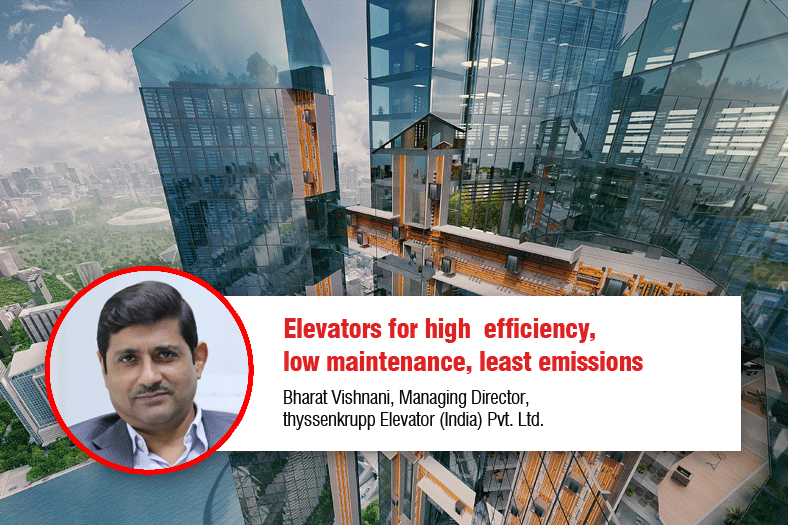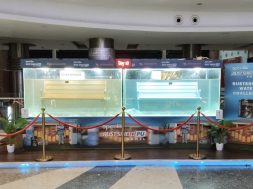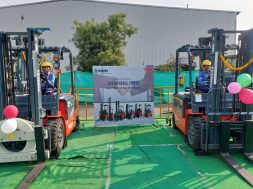Elevators for high efficiency, low maintenance, least emissions

thyssenkrupp Elevator aims to be on the forefront of providing innovative mobility solutions, and has consistently distinguished itself in providing solutions that are tailored for rapidly-developing urban areas including smart cities, says Bharat Vishnani, Managing Director, thyssenkrupp Elevator (India) Pvt Ltd.
How do your products add more value for making better smart cities?
thyssenkrupp invests heavily in research and development (R&D)and by the virtue of it, we have successfully launched energy-efficient elevators and escalators which complement the green rating of a building. We use the latest technology in our product to make them eco-friendlier. Our products are designed with a simple philosophy of higher efficiency, lower maintenance and the least emissions.
While, the latest products come with the green technology, we also have our attention on all existing installed elevators. thyssenkrupp accords high focus to this section of the market, thus converting the already existing elevators into more energy-efficient green elevators. Use energy-efficient and green elevators result into reduced operating cost for the existing buildings.
As compared to conventional elevator control systems, our Destination Selection Control (DSC) system increases passenger handling capacity by up to 30 percent, minimises passenger travel times to their destination and reduces crowding in lift lobbies. DSC also allows for much more flexibility in elevator grouping, lift core layouts and overall building design. It can be applied to new buildings and existing elevator groups.
In addition to deploying permanent magnet synchronous (PMS) gearless traction machines, our high-rise and high-speed elevators developed for smart cities can be equipped with a regenerative drive feature. Adding the regenerative feature can reduce energy consumption of the elevator by up to 50 per cent. We have attached high priority to developing and implementing sustainable solutions for the entire lifecycle of our products and processes. In addition, high standards for health and safety are observed for all products to minimise the use of toxic materials from the R&D to manufacturing stages, as well as in field operations.
What are the latest trends in elevators with respect to smart cities?
New commercial and residential towers in smart cities are expected to meet optimum space utilisation, cost efficiency and ecological expectations. The reduction in energy consumption and emissions that comes with these technological advances will make the smart cities a better place to live. Smart elevators can improve energy efficiency, reduce wait times, integrate access control features, and allow for better control of elevator traffic. Smart elevators can also detect employees of companies based on their IDs and assign them to elevators, utilise touchless summoning and multi-carriage systems for time management, and use the cloud to improve travel speed and comfort and also to analyse performance.
Discuss about the latest technology in this space.
Latest innovations like ‘thyssenkrupp’s TWIN and MULTI’ are the fast and energy efficient elevator systems equipped with intelligent traffic control systems, which optimise traffic automatically and reduce empty runs. We at thyssenkrupp Elevator have pioneered a significant advancement in elevator technology by introducing:
MULTI: MULTI is the world’s first rope-free elevator that moves multiple cars in a single shaft vertically and horizontally. It consolidates multiple carriages into fewer shafts, reduces footprint by up to 50 per cent, helping reduce the building’s overall size, external surface area and total energy consumption.We’ve integrated advances in lightweight design.
TWIN: The TWIN elevator system consists of two cabs that operate in the same shaft independent of each other, and uses less energy while transporting up to
40 per cent more passengers than conventional elevators.
MAX: MAX extends remote monitoring capabilities to dramatically increase current availability levels of existing and new elevators. MAX makes it possible for an elevator to ‘tell’ service technicians its real needs, including real-time identification of repairs, among others.
New commercial and residential towers are expected to meet optimum space utilisation, cost efficiency and ecological expectations.
Bharat Vishnani, Managing Director, thyssenkrupp Elevator (India) Pvt. Ltd.
28
Cookie Consent
We use cookies to personalize your experience. By continuing to visit this website you agree to our Terms & Conditions, Privacy Policy and Cookie Policy.







